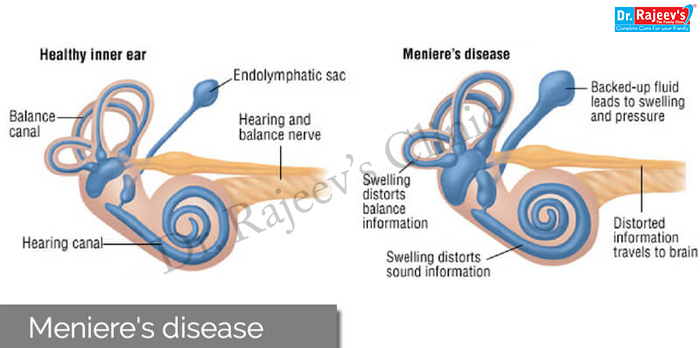

The patient complains of recurrent vertigo associated with deafness and tinnitus. It is either MENIERE'S SYNDROME OR OTOSCLEROSIS.
It occurs between the age of 30 and 6. The attack of acute labyrinthine failure are paroxysmal with recurrent vertigo and vomiting. Each attack leaves the patient with increasing deafness and batwing the attacks there is tinnitus in the affected ear. The disease is bilateral but one side may get affected first. In otosclerosis, there is gradually increasing deafness commenting at an early age. Paracusis, an ability to hear in noisy surroundings is more marked. Tinnitus is marked but giddliness is un common.
Signs and symptoms of Meniere's disease include:
After an episode, signs and symptoms improve and might disappear entirely for a while. Over time, the frequency of episodes may lessen.
The cause of Meniere's disease is unknown. Symptoms of Meniere's disease appear to be the result of an abnormal amount of fluid (endolymph) in the inner ear, but it isn't clear what causes that to happen.
Factors that affect the fluid, which might contribute to Meniere's disease, include:
Because no single cause has been identified, it's likely that Meniere's disease results from a combination of factors.

Chininum sulphuricum acts on the nerves causing great sensitiveness to external influences. There is periodical neuralgia and tinnitus. Violent ringing, buzzing and roaring in the ears with occasional deafness of the same side. Vertigo with tinnitus; whirling, as if the head would fall backwards; noises in the ears, worse during vertigo. The preparations of chininum salicylicum are the most injurious to the structure of the internal ear and there cozzolino said that in all likelihood it is a very powerful homoeopathic cure.
In phosphorus, there is difficulty in hearing human voice, there are echoes and reverberations of sounds, especially of music. There is a constant feeling that there is an obstruction in front of the ears, a foreign body. Constant buzzing in the ears. Vertigo, especially after rising with nausea and headache.
Theridion curassavicum has a peculiar symptom- the patient had extremely hypersensitive nerves and is therefore very hypersensitive to noise which penetrates the body. Rushing noise in both ears, like a waterfall. Vertigo with nausea and vomiting, on least motion, stooping, kneeling.
Silicea terra has a perforated drum and deafness- hears again with a loud retort, on blowing the nose or coughing, worse in full moon. Roaring in the ears, hissing noises, sensation of stoppage in ears. Better when swallowing or yawning. Vertigo, especially when lying on the left side.
Salicylicum acidum has auditory nerve vertigo, with troublesome nausea and head symptom. Hearing is diminished. Deafness with noise in the ears. Roaring and ringing in the ears, buzzing of files or bees. Deafness with vertigo. Tinnitus.